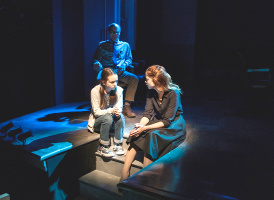
Two Views of "Good for Otto"
by Philip
Dorian and Glenda Frank
“Good for Otto" by David Rabe Another fourth wall bites the dust in The New Group’s production of “Good for Otto,” at the Pershing Square Signature Center. David Rabe’s play, which premiered in 2015 at Chicago’s Gift Theatre, is not set in Grover’s Corners, but, we are told as the cast files into stage-perimeter seats, in the Berkshires town of Harrington, where our host, Dr. Robert Michaels (Ed Harris), is a counselor and chief administrator at Norwood Mental Health Center. The play that follows (after a group hum) takes place in the Center’s offices and treatment rooms and in Dr. Michaels’ haunted memory bank. Acted by a superb 15-member ensemble, directed by New Group’s artistic director Scott Elliott and overlong by just a few minutes at three hours, including intermission, “Good for Otto” is fascinating Theatre. The individually portrayed Norwood Center patients rarely interacting with one another, but their back-stories and treatment regimens are linked by their sessions with the good Doc and his consulting therapist Evangeline Ryder (Amy Madigan). The play is based on material from the book “Undoing Depression: What Therapy Doesn’t Teach You and Medication Can’t Give You” by Richard O’Connor, in which he posits that depression “is not a feeling, but the inability to feel.” (The collaboration between that source material and multi-award-winning playwright Rabe is a formidable one.) The patients are not alone in their various stages of distress; their families are equally affected by their puzzling behaviors and breakdowns, as are even their care providers. It is as if emotional, mental and social maladjustments are contagious. Nora, for example (Rhea Perlman), is driven to distraction by the self-destructive behavior of twelve-year-old Frannie, whom she fosters and wants to adopt. Frannie’s escalating drama also inspires protective instincts in Dr. Michaels…and, via Rileigh McDonald’s stunning performance, in anyone within a half mile. Barely into her adolescence, Ms. McDonald has the acting chops of a seasoned veteran. (Playing Matilda on Broadway was just a warm-up.) Also to the point, Teresa, a patient’s wife (Laura Esterman) cries out “I’m going batty with this way you’re acting” because her husband Barnard (F. Murray Abraham) refuses to get out of bed. For weeks. Dr. Michaels’ own psychological issues come forward in scenes with his mother – scenes that take place in his mind, since Mom had died years before under painful circumstances that are detailed late in the play. Appropriately enough, not having aged in her son’s memory, she is young, attractive, frozen in time. “Don’t you wonder what I am, really?” she asks the audience. “His mother? A ghost?” Charlotte Hope plays her wonderfully – ethereal and no-nonsense all at once. In Dr. M’s fantasy, his mother would be a comfort to Frannie; devoutly to be wished. Title character Otto never appears. He lives with Timothy, a patient with self-control issues, played by Mark Linn-Baker, who does hyper as well as any actor ever. His distress over Otto’s impending intestinal surgery is acutely portrayed, and while Otto is a hamster (that’s not a typo), the fact of his surgery is an apt metaphor for the issues between the Center and its insurance provider, which is Rabe’s sub-text throughout. A conversation between Dr. Michaels and a Colossal Care case manager (Nancy Giles) is an indictment of this country’s health care system. Framed in amusing double-speak, it is nonetheless a searing indictment. As enacted by Harris and Madigan and their “patients,” the therapy sessions have the ring of authenticity. (Asked by a patient if it’s wrong to ask her a personal question, therapist Evangeline replies “It would only be wrong if I answered.”) Under Elliot’s direction, the play’s separate threads mesh into a cohesive unit, with few wasted or unnecessary exchanges. A noted exception to that is the late appearance of patient Alex, played well enough by Maulik Pancholy, but whose monologues interrupt our established interest in the others. One ends up caring about Barnard and Teresa, about Timothy, about Nora, and about all the other patients, perhaps especially about Frannie. And while it’s somewhat of a spoiler, I sense your concern, so rest easy: Otto pulls through surgery just fine.
“Good for Otto,” by David Rabe, directed by Scott
Elliott The New Group has given “Good for Otto” -- a new play by David Rabe (“Sticks and Bones”), based on the book “Undoing Depression” by Richard O’Connor) -- a star-studded production on a small stage, a rare treat in any theatre season. The play comes to us through the mind of Dr. Michaels (Ed Harris), who runs a mental health center clinic in a rural neighborhood in Connecticut. He is haunted by the daily problems of his patients and by guilty memories of his mother (Charlotte Hope), who committed suicide when he was a boy. Later the play opens not only into the stories of his many patients but also into the therapy treatment by his colleague Evangeline Ryder (a charismatic Amy Madigan). The actors (and some audience members) sit on the stage and flow into action when needed. Director Scott Elliott (Artistic Director of The New Group) keeps up a lively pace and the many characters are clearly depicted, but at three hours the play could use some trimming and focus. The most poignant story is of a foster mother (Rhea Perlman) whose 12-year old ward (Rileigh McDonald) keeps returning to her addict mother and cutting herself. Both the courts and the insurance company (personified by Nancy Giles, a corporate double-talker) are unreasonably, maddingly obstructive. There are quasi-comical sessions with a hairy hoarder (Kenny Mellman) and his mother (Laura Esterman), who says she wants her grown son to move out of her house but is an enabler. Evangeline Ryder’s patients are the most familiar. F. Murray Abraham has fun with Barnard, a retired depressive, who sparks to life when he meets a friendly young saleswoman. Maulik Pancholy plays Alex, a self-destructive young man trying to come out of the closet. As the most mysterious character, he becomes the most engaging. Mark Linn-Baker’s Timothy is the star of the play. The casting is counter-intuitive since Baker plays it sweet although Timothy terrifies the people he approaches. The narrative plays against the performance, an intriguing choice. Timothy, mentally challenged, has a best friend, Otto the hamster, who must undergo abdominal surgery. Spoiler alert: Otto survives. Dr. Michaels, frustrated by reality, dreams that his patients come together to sing old-fashioned songs: “Let Me Call You Sweetheart” and “On Moonlight Bay” among others. Despite the musical interludes and the assembled talent, the play rarely hrises. There is no dramatic through line and no one changes, except the pre-teen who is institutionalized. The therapists appear as highly flawed warriors in a losing battle. |
| museums | NYTW mail | recordings | coupons | publications | classified |


